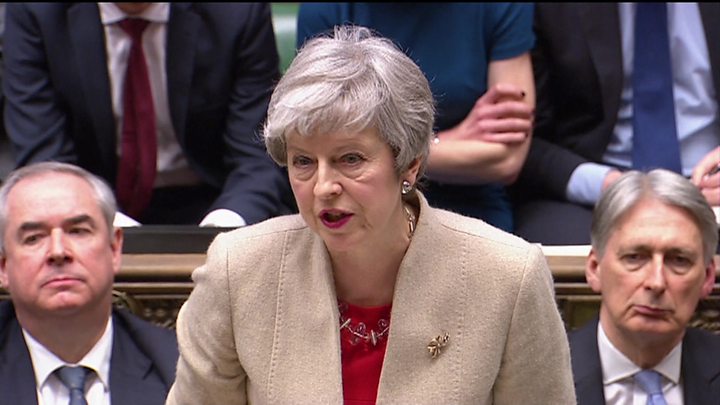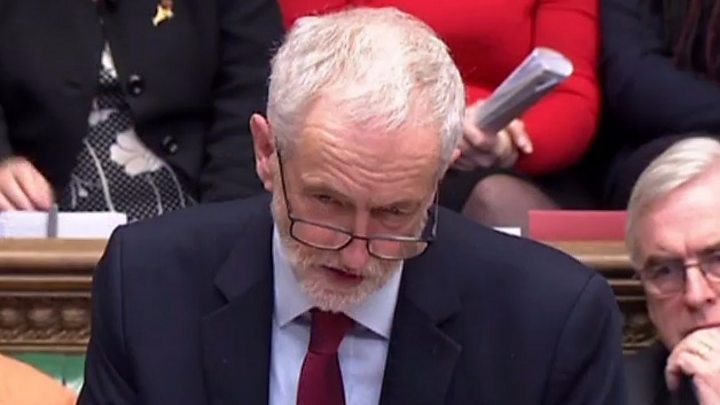LONDON (Reuters) - Britain’s exit from the European Union was in disarray after the implosion of Prime Minister Theresa May’s Brexit strategy left her under pressure from rival factions to leave without a deal, go for an election or forge a much softer divorce.
FILE PHOTO: Britain's Prime Minister Theresa May speaks in the Parliament in London, Britain, March 29, 2019 in this screen grab taken from video. Reuters TV via REUTERS
After one of the most tumultuous weeks in British politics since the 2016 referendum, it was still uncertain how, when or even if the United Kingdom will ever leave the bloc it first joined 46 years ago.
A third defeat of May’s divorce deal, after her pledge to quit if it was passed, left one of the weakest leaders in a generation grappling with a perilous crisis over Brexit, the United Kingdom’s most significant move since World War Two.
Parliament will vote on different Brexit options on Monday and then May could try one last roll of the dice by bringing her deal back to a vote in parliament as soon as Tuesday.
“There are no ideal choices available and there are very good arguments against any possible outcome at the moment but we are going to have to do something,” said Justice Secretary David Gauke, who voted in the 2016 referendum to stay in the EU.
“The prime minister is reflecting on what the options are, and is considering what may happen but I don’t think any decisions have been made,” he told BBC TV.
Many in May’s party, though, have lost patience. The Sun newspaper reported that 170 of her 314 Conservative lawmakers had sent her a letter demanding that Brexit take place in the next few months - deal or no deal.
The United Kingdom was due to leave the EU on March 29 but the political deadlock in London forced May to ask the bloc for a delay. Currently, Brexit is due to take place at 2200 GMT on April 12 unless May comes up with another option.
“IT IS A MESS”
The labyrinthine Brexit crisis has left the United Kingdom divided: supporters of both Brexit and EU membership marched through London last week. Many on both sides feel betrayed by a political elite that has failed to show leadership.
Parliament is due to vote at around 1900 GMT on Monday on a range of alternative Brexit options selected by Speaker John Bercow from nine proposals put forward by lawmakers, including a no-deal exit, preventing a no-deal exit, a customs union, or a second referendum.
“We are clearly going to have to consider very carefully the will of parliament,” Gauke said.
With no majority yet in the House of Commons for any of the Brexit options, there was speculation that an election could be called, though such a vote would be unpredictable and it is unclear who would lead the Conservatives into it.
The Sunday Times said May’s media chief, Robbie Gibb, and her political aide Stephen Parkinson were pushing for an election against the will of her chief enforcer in parliament, Julian Smith.
The Conservative Party’s deputy chair, James Cleverly, said it was not planning for an election. But the deputy leader of the opposition Labour Party, Tom Watson, said his party was on election footing.
Labour’s foreign affairs spokeswoman, Emily Thornberry, said it could try to call a vote of no confidence in May’s government.
“We don’t know if she is going to remain prime minister, if we are going to get somebody else, who that other person is going to be - it is a mess,” Thornberry said.
Opponents of Brexit fear it will make Britain poorer and divide the West as it grapples with both the unconventional U.S. presidency of Donald Trump and growing assertiveness from Russia and China.
Supporters of Brexit say while the divorce might bring some short-term instability, in the longer term it will allow the United Kingdom to thrive if cut free from what they cast as a doomed attempt in European unity.
Reporting by Kylie MacLellan and Guy Faulconbridge; Editing by Raissa Kasolowsky
https://www.reuters.com/article/uk-britain-eu/brexit-in-meltdown-theresa-may-under-pressure-to-forge-softer-divorce-deal-idUSKCN1RC0EE
2019-03-31 11:38:00Z
52780249686109








